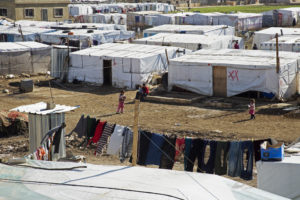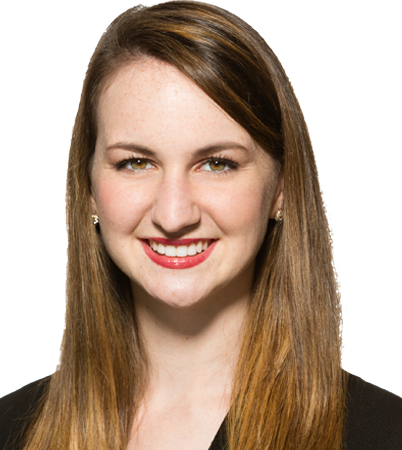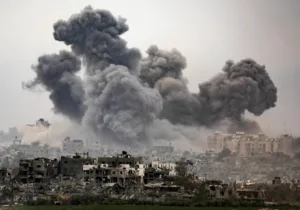Marvin Lahoud, a 26 year-old volunteer with a Lebanese church serving Syrian refugees, was in charge of food voucher distribution. On this day, Marvin discovered that one of the refugee families returned to Syria leaving him with an extra voucher to distribute to another family.
He scanned the wait list. The first family he called—also returned to Syria. The second family didn’t answer the phone. Further constraints led Marvin to dismiss the third and fourth families from the wait list. Marvin finally decided to make his way over to the house of the fifth family.
A little boy stood at the entrance of the basement space his family called home, looked up at Marvin, and smiled. Matter-of-factly the Syrian boy said, “Come in. We were expecting you.”
Marvin looked at him—puzzled. He hadn’t told anyone he was coming; much less contacted the Muslim Syrian refugee family. How could they have known he was coming?
The young Syrian boy’s mother beckoned Marvin into their home and asked the boy to explain.
“Yesterday”, the little boy said, “I had a dream that was so vivid I thought it was real. I was walking on the shore of the sea and saw a man standing in the sea with water up to his knees. He was clothed in a bright white robe. His face shined so bright, I couldn’t see the details of his face. His hands were noticeably tender. I asked him who he was. He said, ‘I am Jesus.’ I said, ‘What do you want?’ Jesus said, ‘I want you to believe in love, have faith and keep hope.’ And Jesus continued to say, ‘Do not be afraid. Help is on the way. Tomorrow, a man will come over called Marvin and he will help you and your family.’”
And now you are here, said the mother to Marvin.
***
Marvin is the personification of help on the way. And he is just one of many Lebanese Christians serving the growing community of refugees in Lebanon. Lebanon, a country no larger than the state of Connecticut, is home to 4 million people, at least 1.5 million of whom are registered Syrian refugees. Unlike Turkey or Jordan, there are no formal refugee camps in Lebanon, only informal tented settlements where millions of refugees reside. The Lebanese government refuses to repeat its experience with Palestinian refugees, where to this day Lebanon houses over 400,000 third and fourth generation Palestinians in ghetto-like conditions in formalized refugee camps.

Syrian refugees in Lebanon live in dire conditions. Food is scarce, despite stipends from the World Food Programme, assistance from the United Nations High Commissioner for Refugees (UNHCR), and help from humanitarian organizations like World Vision and others. Informal tented settlements are just that—informal tents with car tires on top to keep the tarp, a meager replacement for a roof, above their heads. In more updated tented settlements, NGOs come to lay concrete or gravel to help mitigate the effects of mud and water that invade the refugees’ homes during the rainy seasons and the snowy wintry months.
Day in and day out, Syrian refugee families do their best to eke out a living. It is often impossible for men to work due to the difficulty in acquiring a work permit from the Lebanese government. Instead, many families resort to sending their children to work in construction, agriculture, or local stores. And child labor has become a necessity to make ends meet. Under these conditions, whole generations of Syrian children are missing out on vital education.
When asked what they hope for their children, Syrian families say that that they want nothing more than for their children to get a good education and have a bright future. Many families acknowledge that local schools and humanitarian organizations have made schooling available to their children, but they regret that they must forego school in favor of survival.
Some families dream of returning to Syria, while others deeply desire to resettle in third countries like the United States, Canada, or Germany. But hope of a return to Syria and of resettlement is slim. The war rages on in Syria, and worldwide statistics from the UNHCR report that less than one percent of refugees are ever resettled in third countries.
***
In the midst of such dire circumstances, civil society and church communities in Lebanon are providing necessary assistance to Syrian refugees. And the fulfillment of many refugees’ dreams rests on the generosity and sacrifice of countless individuals deciding to serve their community.
Resurrection Church in Beirut, Lebanon has welcomed Syrian refugees into its church. The church provides a number of services, including schooling for Syrian children, marriage counseling for Syrian refugee spouses, and food and blankets for anyone who comes knocking. Pastor Hikmat Kashouh, who serves as the senior pastor at Resurrection Church, says that welcoming Syrian refugees, regardless of whether they are Christian or Muslim, into his church has required a process of reconciliation and forgiveness due to the long history of conflict between Syrians and Lebanese. But the congregation, now more than 1,000 people, today openly welcomes Syrian refugees.
It is a miracle that Lebanon hosts any Syrian refugees at all. While it shares a border with Syria, relations between the neighbors in the not-to-distant past were bloody. Just eleven years ago, the two countries were at war with one another, and Lebanon is still recovering from its own civil war in 2006—the vestiges of bygone bombings still dot the countryside.
Stories likes Resurrection Church are not uncommon in Lebanon. Many other individuals and organizations have mobilized to serve Syrian refugees.
Rosette Mansour (formerly Rosette Lahoud), mother of Marvin, has her own story of reconciliation with the Syrian people; her own story of promise that help is on the way.
Rosette recalls back to the war between Lebanon and Syria when she was pregnant with her daughter, and Marvin was only 10 months old. On October 13, 1990, bombs were going off all around them. All of their neighbors had fled, and now Rosette, her former husband, son, and unborn child were faced with a difficult decision: stay and risk being killed or flee their home.
Deciding to flee, they hopped in their car and drove speedily toward what they thought were Lebanese troops. Evacuating their car, they ran toward the troops. The troops were not Lebanese, but Syrians who subsequently seized them and other innocents fleeing Lebanese.
The Syrian troops lined up the Lahouds along with two other Lebanese. “Turn around!” yelled the Syrian soldiers ordering Rosette to hold Marvin above her head before they shot her.
“It did not occur to me to pray ‘God save me’ because there was no way that we could escape…I just prayed, ‘God, take my life before the life of my family. I cannot tolerate seeing my family dying in front of me,’” recalled Rosette.
Within moments, there was a big explosion. Rosette opened her eyes thinking she had died and gone to heaven. It all happened faster than her mind could imagine or grasp. But a Lebanese army tank had come up behind Rosette and her family and bombed and killed or maimed every single Syrian military man who just moments before nearly killed the entire Lahoud family.
While Rosette and her family survived the brutal war, they were not left unscathed but with deep scars and searing pain in their hearts. For a long while, Rosette could not even stand to see or hear Syrians. When Syrians began fleeing to Lebanon, she prayed to God requesting that she could just serve the Syrian refugee population through prayer, but God was calling her to serve more directly.
After her son started ministering to Syrian refugees, she decided to go along to a visit with a Syrian refugee family. On her first visit, she met a 23 year-old Syrian refugee widow and her brother. The brother asked Rosette and others from the aid organization,
Why do you love us? Why do you care for us? We killed you. We kidnapped your children. We occupied your land. We were your enemies. Why do you love us?
Rosette recalled her colleagues saying,
It is not because of our strength, but because of God’s love in our hearts.
Ever since, Rosette has dedicated her life to serving Syrian refugees and their families. Her story is one of great forgiveness, healing, and reconciliation and is an inspiration to all considering how best to love and serve their neighbor—even the neighbor they have good reason to hate.
The current refugee crisis is one of the most pressing humanitarian issues of the day. Today, the United Nations estimates that there are over 65 million displaced persons worldwide; the highest number of displaced persons since World War II. Of that, the UN believes that there are close to 5 million registered Syrian refugees. Each one of these families are in need of basic necessities including food, water, and shelter. But most importantly, Rosette noted, they are in need of community—a listening ear that will take heed of their trials and in some cases just listen.
There is a role for government, private citizens, and civil society to play, not just to listen, but to take concerted action to provide relief for the hurting people of war-torn Syria. Resettlement isn’t the only means of support, however. In a forthcoming paper, The Heritage Foundation evaluates the durable solutions most relevant to providing relief in the midst of the most significant refugee crisis the world has experienced in over five decades.
As witnessed in Lebanon, however, government solutions alone won’t meet one of the most pressing needs this crisis presents: the need for community. There is an especially important role for the global church to play in supporting the widow, the orphan, the alien, and the oppressed—of which Syrian refugees form a significant percentage. The need for community is deep, and the church has a long history of providing community where it is needed most.
The needs are big, and timing is urgent in the midst of the Syrian refugee crisis. Hopefully, when we are called upon we can say with assurance: Do not be afraid. Help is on the way.
—
Olivia Enos, research associate in the Asian Studies Center at The Heritage Foundation, specializes in human rights and transnational criminal issues. These include human trafficking and human smuggling, drug trafficking, religious freedom, and other social and humanitarian challenges facing Asia.
Photo Credit: Rawaa, 21, a mother of three from Aleppo, draws water from a storage tank in her tent at an informal tented settlement for Syrian refugees in the Bekaa Valley, Lebanon, in July 2014. Photo by Sam Tarling for Norwegian Relief Council, posted by Directorate-General for European Civil Protection and Humanitarian Aid Operations (ECHO), via Flickr.







 Live in the DC area? Sign-up for Providence's in-person events list!
Live in the DC area? Sign-up for Providence's in-person events list!